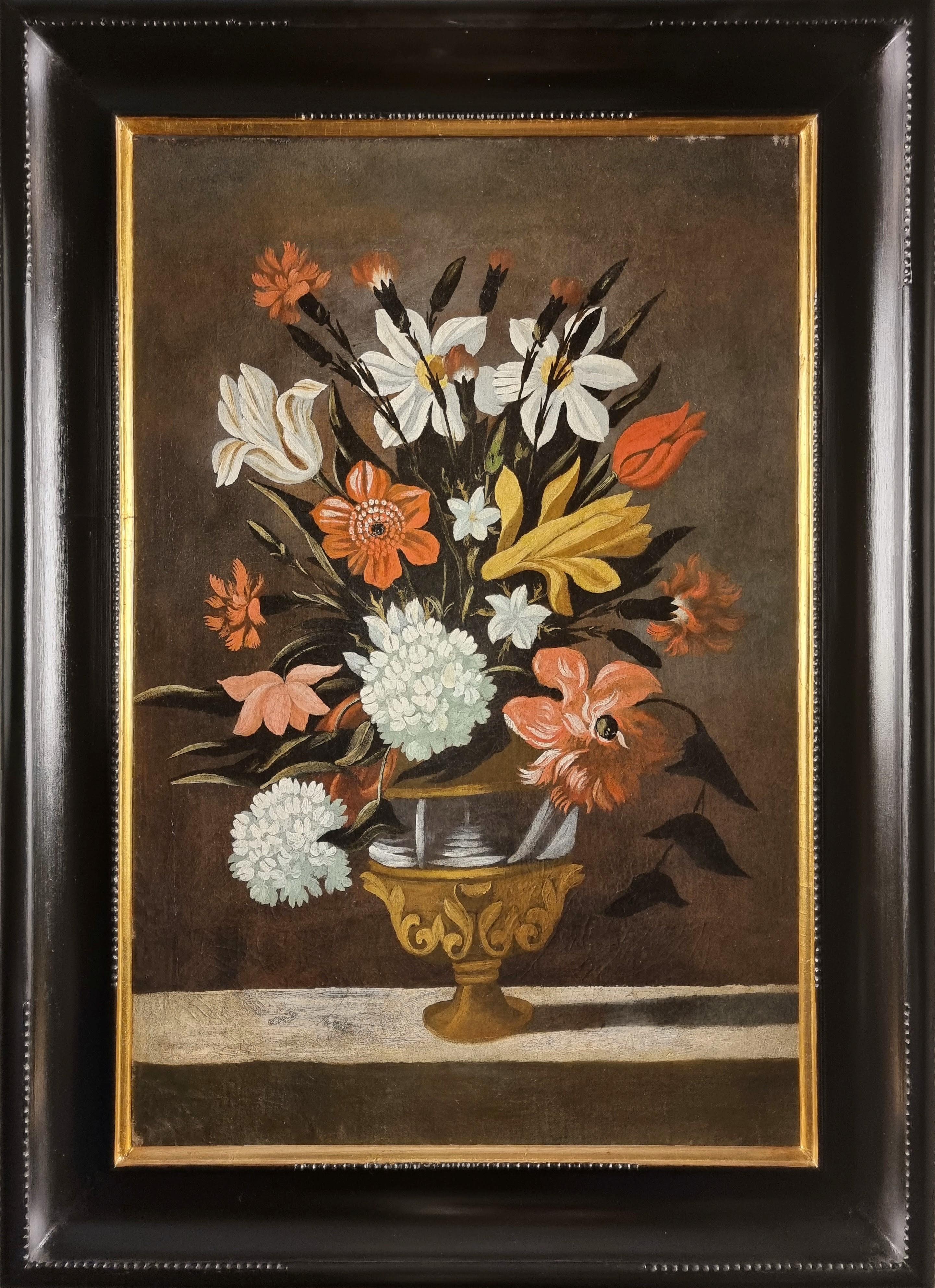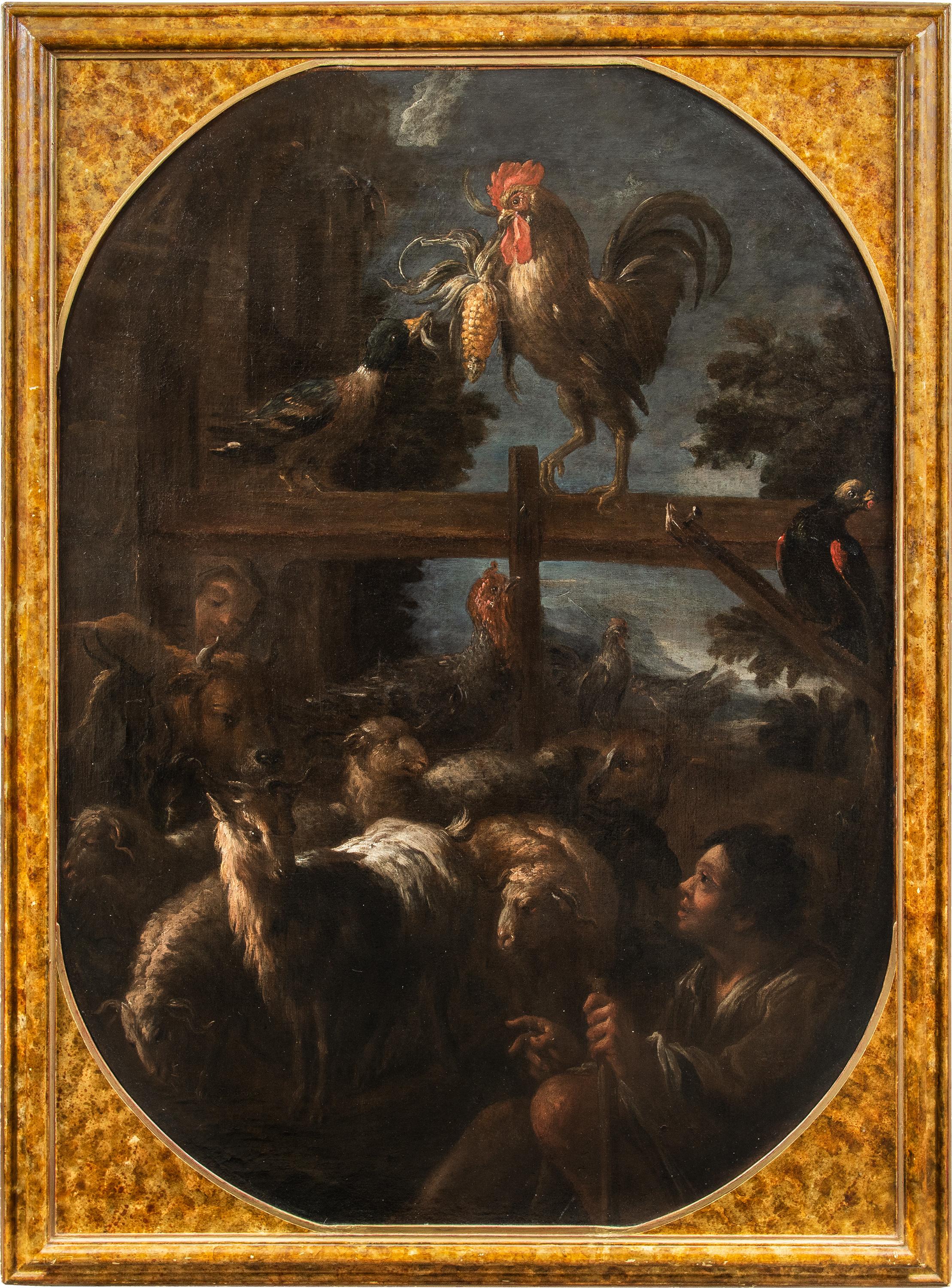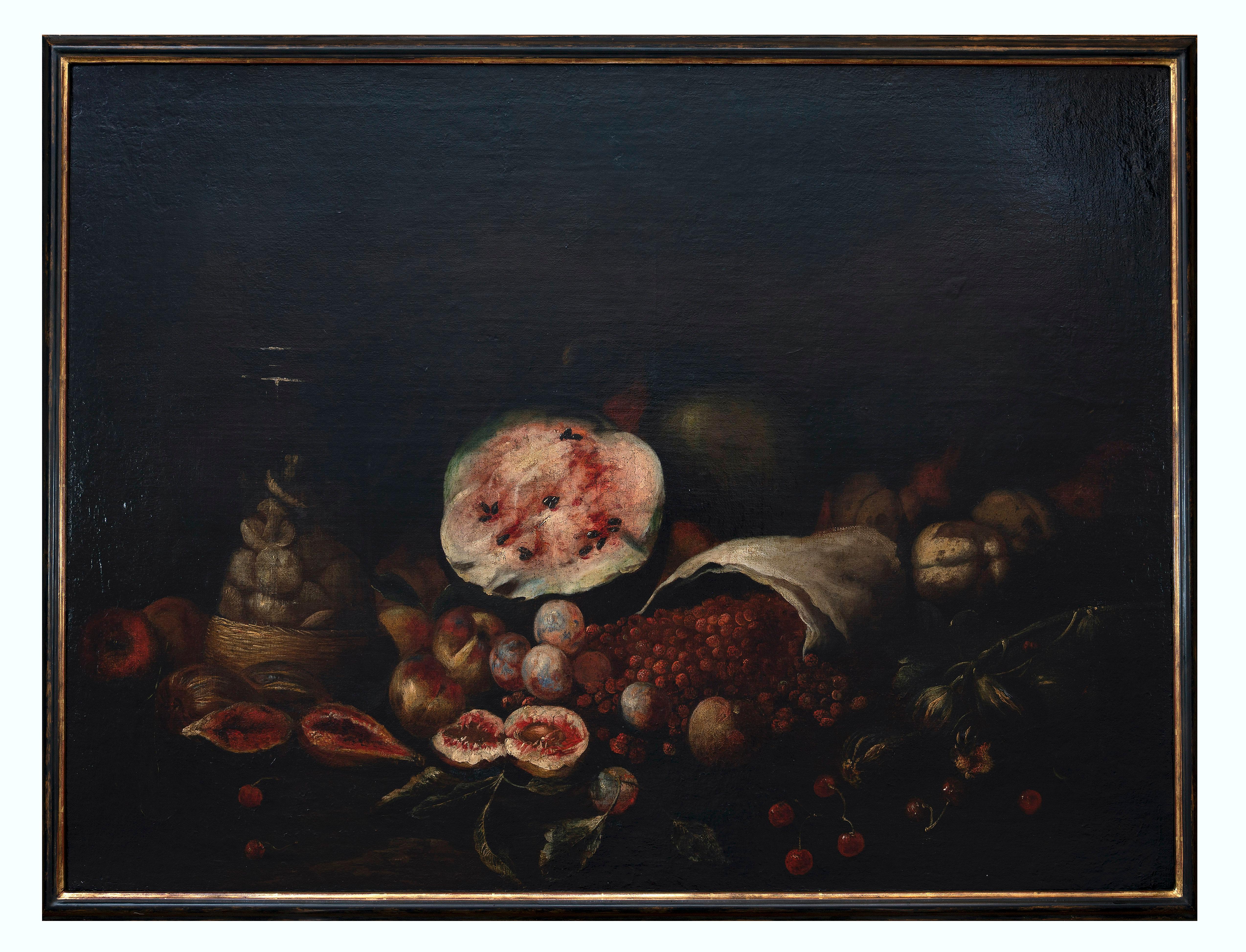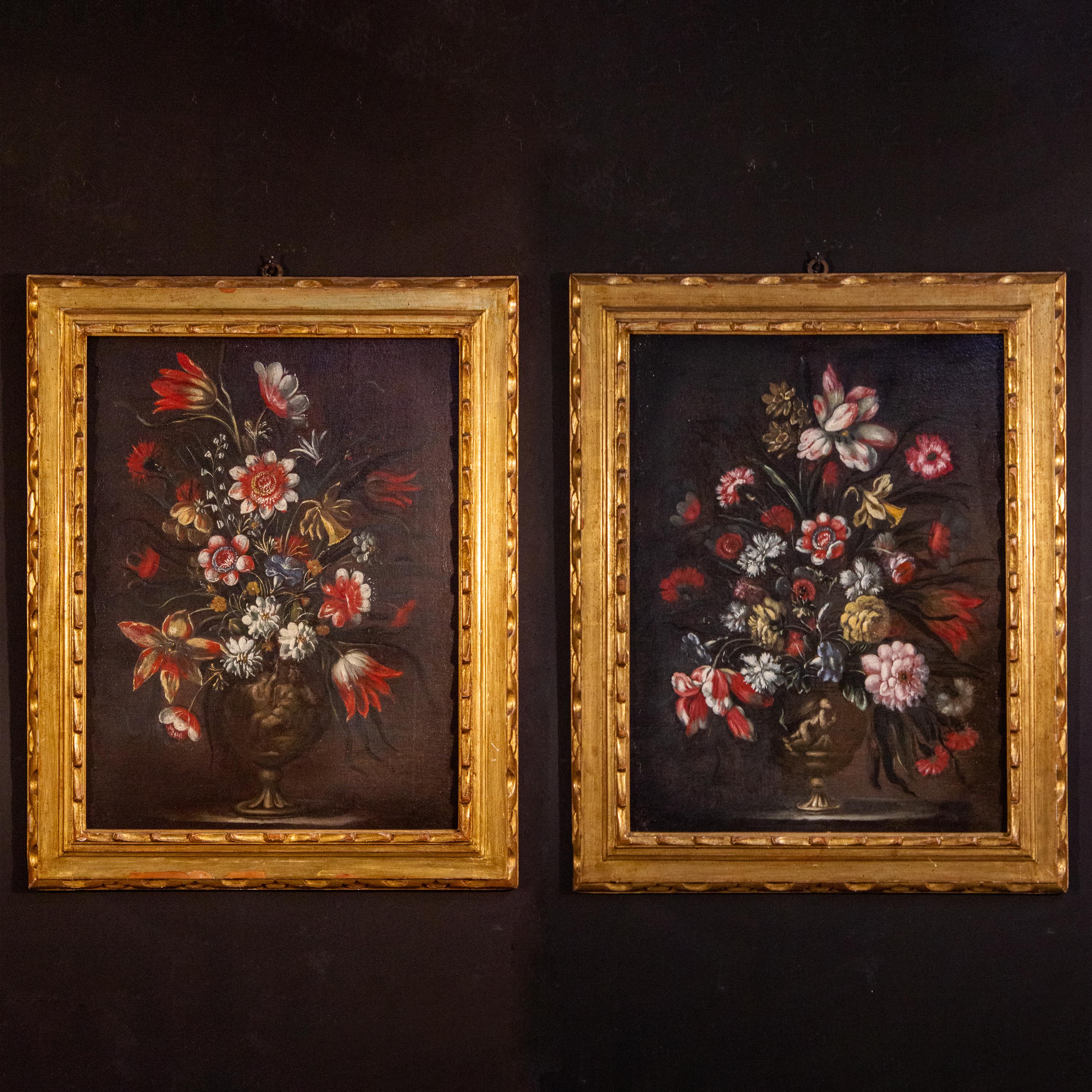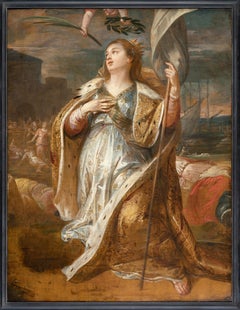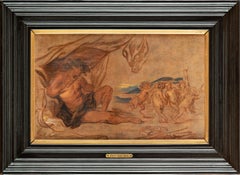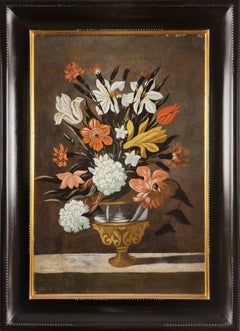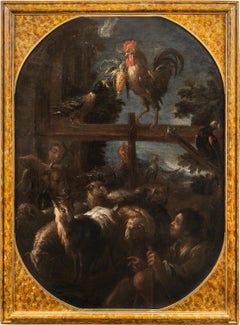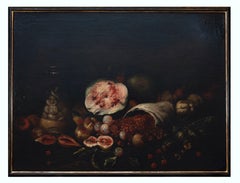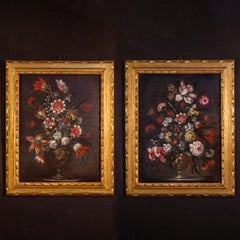Items Similar to Hendrick Bloemaert, Allegory of Justitia, Justice, signed, dated, Old Master
Video Loading
Want more images or videos?
Request additional images or videos from the seller
1 of 13
Hendrick BloemaertHendrick Bloemaert, Allegory of Justitia, Justice, signed, dated, Old Master1638
1638
$10,048.43
£7,497.80
€8,500
CA$13,981.13
A$15,645.21
CHF 8,138.81
MX$188,512.83
NOK 102,463.88
SEK 96,811.31
DKK 64,716.95
About the Item
Hendrick Bloemaert
An Allegory of Justitia protecting Innocence from Calumny, Treachery and Deceit
signed and dated 'HBloemaert fc. 1638' (HB linked, lower right, on the pedestal)
oil on canvas
85.5 x 110.3 cm
Provenance
H. Hoogers, Nijmegen, 7 June 1816, lot 6, as Cornelis Bloemaert.
J. Brolsma, Ede, 1957.
with Baer, The Hague, 1960.
Collection Hirschberg, The Hague.
Anonymous sale; Heerlen, 10 April 1962, lot 121 (as measuring 68 x 108 cm.)
Sale of Christie's Amsterdam: Tuesday, November 25, 2014 [Lot 00045]
Old Masters, 19th Century and Impressionist Art
Literature
Marcel Roethlisberger, Abraham Bloemaert and his sons, I, Doornspijk, 1993, pp. 475-6, no. H73, fig. H75
The present painting was bought by the present owner in the 1970s in The Netherlands in the art trade. He collected numerous paintings of the Dutch Golden Age and was specially fascinated by this work as it is the only known work by Bloemaert with an allegorical subject. Bloemaert depicts the Allegory of Justice. Due to personal circumstances the owner tried to sell the work at Auction but failed. Two years ago the great collector died and the painting is now offered directly from the inheritance.
The work by Bloemaert is in a good condition and is framed.
- Creator:Hendrick Bloemaert (1601 - 1672, Dutch)
- Creation Year:1638
- Dimensions:Height: 33.67 in (85.5 cm)Width: 43.43 in (110.3 cm)
- Medium:
- Movement & Style:
- Period:
- Condition:
- Gallery Location:Greven, DE
- Reference Number:1stDibs: LU1550211702832
About the Seller
4.8
Gold Seller
Premium sellers maintaining a 4.3+ rating and 24-hour response times
Established in 2011
1stDibs seller since 2021
30 sales on 1stDibs
Typical response time: 2 hours
- ShippingRetrieving quote...Shipping from: Greven, Germany
- Return Policy
Authenticity Guarantee
In the unlikely event there’s an issue with an item’s authenticity, contact us within 1 year for a full refund. DetailsMoney-Back Guarantee
If your item is not as described, is damaged in transit, or does not arrive, contact us within 7 days for a full refund. Details24-Hour Cancellation
You have a 24-hour grace period in which to reconsider your purchase, with no questions asked.Vetted Professional Sellers
Our world-class sellers must adhere to strict standards for service and quality, maintaining the integrity of our listings.Price-Match Guarantee
If you find that a seller listed the same item for a lower price elsewhere, we’ll match it.Trusted Global Delivery
Our best-in-class carrier network provides specialized shipping options worldwide, including custom delivery.More From This Seller
View AllHercules and Omphale, Old Master Painting, Mannerism, Baroque, Mythology, Prague
Located in Greven, DE
Hercules and Omphale
Oil on panel, 52 x 41 cm
According to legend, Hercules had to make atonement and became a slave to the Lydian queen Omphale. When she found out who her slave was, she married him. Falling for his mistress and made effeminate by the luxury of court life, the former hero allowed himself to become the laughing stock of the court. He dressed in women's clothes, spun wool and did other women's work, whereas Omphale wore his lion's skin and carried a wooden club. When the time of punishment was over, the hero realised his delusion and left Omphale.
So far, the painting could not be clearly assigned to an artist. Nevertheless, it impresses with its fluid and convincing painting, whose colourfulness and conception are reminiscent of the Prague School around Bartholomäus Spranger.
This work follows an engraving and an etching made by Michel Dorigny in 1643 after a design by Simon Vouet. It shows the same scene but the print differs in minor details from the present painting (see e.g. the head of the lion) and the treatment of the faces seems to be painted more detailed and refined.
So far there is no painting...
Category
17th Century Baroque Figurative Paintings
Materials
Oil, Panel
Italian School, Nicolo Grassi, 18th, Worship of Venus, The Venus Sacrifice, Amor
Located in Greven, DE
Italian School, 18th Century, Circle of Grassi,
This old master drawing is drawn in the late-Baroque or Rococo style.
It depicts a woman worshipping Venus/ preparing a sacrifice for ...
Category
Late 17th Century Baroque Figurative Drawings and Watercolors
Materials
Handmade Paper
$1,631 Sale Price
40% Off
Boeckhorst, Rubens, Saint Ursula, Decorative Old Master, Woman, Baroque, Flemish
By Jan Boeckhorst
Located in Greven, DE
Johann Boeckhorst (Münster 1604 - Antwerp 1668)
Saint Ursula
Oil on canvas, 112 x 86 cm
Provenance:
New York, Christe's, 20.3.1981, lot 88 (as Van Diepenbeeck's circle)
The presen...
Category
17th Century Baroque Figurative Paintings
Materials
Canvas, Oil
Thomas Willeboirts Bosschaert, Dancing Putti, Pan, Satyr, Rubens School, Model
By Thomas Willeboirts Bosschaert
Located in Greven, DE
Thomas Willeboirts Bosschaert
Pan plays to the dance of the putti
Thomas Willeboirts Bosschaert (1614 Bergen op Zoom - 1654 Antwerp)
Pan plays to the dance of the putti
Oil sketch
Oil on canvas, 35 x 51 cm
Provenance:
Belgian private collection, ca. 1980 to 2020.
The oil sketch shows a flute-playing man with dark curls sitting at the left edge
of the picture in a recess draped with cloth. In the lower left corner, a fallen
bowl with leaking water can be seen. The right half of the picture shows a circle
of five dancing putti, whereby the left putti can be recognized as a satyr due to
the goat legs. The background is dominated by a dark mountain landscape. In
the sky a rising or setting sun can be guessed. It is possible that the flute player
represents Bacchus, the god of wine and ecstasy. This fits with the flute as a
symbol of celebration, as well as the bowl of water, which could refer to
Bacchus' mother, Lethe. Lethe is a river in the underworld, which at the same
time symbolizes "oblivion". Thus, the spilling water bowl is not only a reference
to this river, but it also symbolizes "oblivion". Moreover, Bacchus is usually
depicted with satyrs in his retinue, which would explain the putto with goat legs.
However, the interpretation of the flute player as the god Pan would be
possible. He is usually shown with his flute and associated with dance.
Moreover, he is native to the mountainous landscape of Arcadia.
The present work is an oil sketch, i.e. a preparatory study. This is suggested by
the partly unfinished parts, as well as the structure of the picture. Some parts
are already almost completely laid out, such as the flute player, while others, for
example the horizon and also the figures of the putti, are only sketched in
outline.
The painting can be attributed to the Baroque painter Thomas Willeboirts
Bosschaert. This attribution was also confirmed by Prof. Hans Vlieghe.
Bosschaert lived and worked in Antwerp with Peter Paul Rubens and Anthonis
van Dyck, among others. He studied with Gerard Seghers...
Category
17th Century Baroque Figurative Paintings
Materials
Canvas
$17,023 Sale Price
20% Off
Free Shipping
Old Master Painting, Flemish Baroque Grisaille, Cornelis Schut, Mary with Child
Located in Greven, DE
Cornelis Schut, atrributed to
(1597 - Antwerp - 1655)
Mary with Child, St. Elisabeth and John the Baptist en grisaille
Oil on wood, 33,5 x 26,5 cm
Co...
Category
17th Century Baroque Figurative Paintings
Materials
Oil
Flemish 17th, Orpheus and Animals, Large Decorative Wall Old Master Painting
Located in Greven, DE
Flemish school, 17th century
Orpheus and the animals
Oil on canvas, 146,5 x 217 cm
Provenance: South German private collection.
On an impressive, room-filling format, this painting depicts "Orpheus and the Animals."
The harp-playing Orpheus sits centrally in front of a tree whose trunk bifurcates above his head. This central tree frames with its crown the scenery towards the horizon and at the same time offers through branches the possibility for many birds to find space. The left half of the picture is characterized by a seascape, at the edge of which the ruins of a castle can be seen deep in the background. This seascape, framed by mountains on the horizon, is the only area where sky can be seen. On this side, waterfowl such as storks, swans and ducks can be seen. In the right half, the viewer looks into a deep European forest. On this right side, more land animals can be found, such as deer, rabbits and lions, among others. Orpheus wears opulent red and gold trimmed clothing, under his blue breastplate we see a white shirt. His feet are adorned by elaborate sandals. His head is surrounded by a radiant laurel wreath ("poeta laureatus"). The young man is clearly identifiable as the singer and poet of Greek mythology, Orpheus, by his harp, the laurel wreath and the animals surrounding him.
Orpheus was one of the Argonauts who, under Jason, was searching for the Golden Fleece. He sang so beautifully that he even conquered the angry sea and enemies by the magic of his lyre. During the journey, Orpheus is said to have drowned out even the sirens with his singing. It is said that he was the greatest of all poets and charmed people, animals, stones and trees with his singing.
In total, 51 birds and 37 different species are depicted in the painting. The animals are mostly depicted in great detail and, except for a few, can be identified. Mainly European species of animals are shown. Exceptions are the ostrich-like nandu peeking out from behind the deer, as well as the large parrot on the upper left, and the two lions. Similar is the case for the large animal directly behind Orpheus on the right. The shape of the head suggests an arctic fox from the polar regions, even though the body is much too large. The arctic fox was first described in 1555 by Olaus Magnus. However, it could also be a depiction of a brown or black bear.
An unusual detail is the animal, which is relatively isolated in the right background and looks to the left. It is not clearly identifiable, but it shows certain similarities with the Australian kangaroo. This was first described by Vespucci in 1500 and further by Francisco Pelsaert in 1629. If it is indeed a kangaroo, this would be one of the earliest surviving pictorial representations.
In this painting, Orpheus is accompanied by a small monkey playing a viola da gamba. This is an iconographic peculiarity. In general, this painting has some peculiarities compared to other paintings with "Orpheus and the animals". The central positioning of Orpheus is quite common, but he usually holds a lyre and is dressed in an antique style, but not as opulently. The choice of animals is also remarkable: European animals in particular are seen, hardly any exotic features, such as camels or elephants.
The two lions in the right foreground are a quotation from Peter Paul Rubens and his depiction of "Daniel in the Lion's Den", which was realized in an engraving.
The present painting can be classified as belonging to the Flemish School of the 17th century on the basis of its painterly and compositional conception. From the circle of Jan Brueghel the Younger are numerous representations of this Orpheus - theme, which take it as an opportunity to show as many exotic animals. There are also echoes of Spanish painters such as Juan de Arellano...
Category
17th Century Baroque Landscape Paintings
Materials
Canvas, Oil
You May Also Like
Primitive Spanish vase of flowers, after Pedro de Camprobín
Located in New York, NY
Early 18th Century still life, very close to Pedro de Camprobín.
Category
Early 18th Century Baroque Still-life Paintings
Materials
Oil, Canvas
$2,800 Sale Price
65% Off
Free Shipping
Felice Boselli (Baroque) - 18th century figure painting - Still life Sheperds
By Felice Boselli
Located in Varmo, IT
Felice Boselli (Piacenza 1650 - Parma 1732) - Shepherd with flock and game.
155 x 112 cm without frame, 170 x 126 cm with frame.
Ancient oil painting on canvas, in a wooden frame lacquered in faux marble. The painting has stylistic affinities with "Game with children playing with a dog" (Parma, Galleria Nazionale) and with the pair of paintings "Old man and girl...
Category
Early 18th Century Baroque Still-life Paintings
Materials
Oil, Canvas
Still Life with fruits - Oil Paint On Canvas - 17th Century
Located in Roma, IT
Still Life with fruits is an original oil on canvas realized in the 16th Century by an Italian School Master.
Original oil painting on Canvas.
The painting represents a still life...
Category
17th Century Baroque Still-life Paintings
Materials
Oil, Canvas
Pair of 18th century Italian Still Life Paintings of Flowers
Located in Rome, IT
Pair of very decorative Italian Still-life paintings of flowers with vases and classical figures .
18th century, oil on canvas, with original gilt-wood frames.
This pair is an exce...
Category
18th Century Baroque Still-life Paintings
Materials
Oil
Pair of 18th century Italian Still Life Paintings of Flowers
Located in Rome, IT
Pair of very decorative Italian Still-life paintings of flowers with vases and classical figures .
18th century, oil on canvas, with original gilt-wood frames.
This pair is an exce...
Category
18th Century Baroque Still-life Paintings
Materials
Oil
Pair of 18th century Italian Still Life Paintings of Flowers
Located in Rome, IT
Pair of very decorative Italian Still-life paintings of flowers with vases and classical figures .
18th century, oil on canvas, with original gilt-wood frames.
This pair is an exce...
Category
18th Century Baroque Still-life Paintings
Materials
Oil
$17,023 Sale Price
20% Off
More Ways To Browse
Age Of Innocence
1816 Painting
Auction Dutch Painting
Abraham Bloemaert
Oil Paintings White Dress
Oil On Canvas By Pierre
Pierre Signed Oil Painting
Oriental Painting
Painting Men Working
Resting Woman Paintings
Prince Oil Painting
Oil Painting Man 19th
Two Boys Art
Acrylic Cartoon Paintings
Signed Fleur
1950s Portrait Oil Paintings
European Horse Painting
Spanish Village Painting
